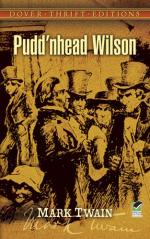“Our father survived his misfortunes only a month, our mother soon followed him, and we were alone in the world. Our parents could have made themselves comfortable by exhibiting us as a show, and they had many and large offers; but the thought revolted their pride, and they said they would starve and die first. But what they wouldn’t consent to do, we had to do without the formality of consent. We were seized for the debts occasioned by their illness and their funerals, and placed among the attractions of a cheap museum in Berlin to earn the liquidation money. It took us two years to get out of that slavery. We traveled all about Germany, receiving no wages, and not even our keep. We had to be exhibited for nothing, and beg our bread.
“Well, madam, the rest is not of much consequence. When we escaped from that slavery at twelve years of age, we were in some respects men. Experience had taught us some valuable things; among others, how to take care of ourselves, how to avoid and defeat sharks and sharpers, and how to conduct our own business for our own profit and without other people’s help. We traveled everywhere—years and years—picking up smatterings of strange tongues, familiarizing ourselves with strange sights and strange customs, accumulating an education of a wide and varied and curious sort. It was a pleasant life. We went to Venice—to London, Paris, Russia, India, China, Japan—”
At this point Nancy, the slave woman, thrust her head in at the door and exclaimed:
“Ole Missus, de house is plum’ jam full o’ people, en dey’s jes a-spi’lin’ to see de gen’lemen!” She indicated the twins with a nod of her head, and tucked it back out of sight again.
It was a proud occasion for the widow, and she promised herself high satisfaction in showing off her fine foreign birds before her neighbors and friends—simple folk who had hardly ever seen a foreigner of any kind, and never one of any distinction or style. Yet her feeling was moderate indeed when contrasted with Rowena’s. Rowena was in the clouds, she walked on air; this was to be the greatest day, the most romantic episode in the colorless history of that dull country town. She was to be familiarly near the source of its glory and feel the full flood of it pour over her and about her; the other girls could only gaze and envy, not partake.
The widow was ready, Rowena was ready, so also were the foreigners.
The party moved along the hall, the twins in advance, and entered the open parlor door, whence issued a low hum of conversation. The twins took a position near the door, the widow stood at Luigi’s side, Rowena stood beside Angelo, and the march-past and the introductions began. The widow was all smiles and contentment. She received the procession and passed it on to Rowena.
“Good mornin’, Sister Cooper”—handshake.
“Good morning, Brother Higgins—Count Luigi Capello, Mr. Higgins” —handshake, followed by a devouring stare and “I’m glad to see ye,” on the part of Higgins, and a courteous inclination of the head and a pleasant “Most happy!” on the part of Count Luigi.




